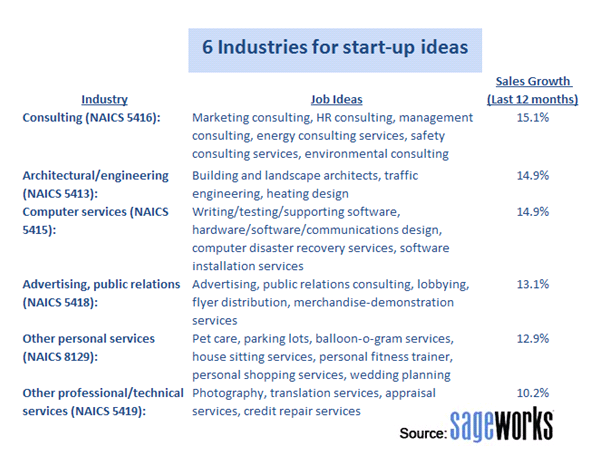With huge success stories like Bill Gates, Sam Walton and Mark Cuban, Americans see what a good idea and working hard can accomplish, and many regularly hear that independent streak calling them. A U.S. unemployment rate that remains around 7.6 percent also means that many Americans have been unable to find a full-time job with an employer, so they may be looking for ways to earn a living on their own.
Indeed, nearly half of Americans dream of starting a business, according to a recent survey by The UPS Store. And while the number of "business births" and their associated employment remain below pre-recession levels, small businesses have been at the core of the economic expansion, according to the U.S. Small Business Administration. Small businesses, which the SBA defines as fewer than 50 employees, represent more than 99 percent of all businesses and about half of the private-sector economy.
Sageworks, a financial information company, recently researched which service-based businesses could be good options for people looking to start their own companies. Through its cooperative data model, Sageworks collects the financial statements of private companies from accounting firms, banks and credit unions, aggregating the data at an approximate rate of 1,000 statements a day and generating benchmark performance statistics.
Service-based businesses are good to consider because they typically require little to no capital to start, and a person can walk out the door and start making money with hard work.
Among U.S. service industries with the highest sales growth in the 12 months ended May 31, Sageworks found several types of businesses that could be started by one person. Each of these industries has also generated solid profit margins relative to all other industries, based on Sageworks' data.
"Private companies, on average, are growing at a healthy rate and have improved margins relative to last year," said Sageworks analyst Libby Bierman. "But they continue to hold off on hiring. If a job seeker is frustrated, these services industries could be a good place to focus energy. They have lower entry costs than most sectors - need little-to-no inventory investment, can operate out of your house or a small rental location, and don't require heavy equipment."

One major industry posting healthy sales growth that lends itself to entrepreneurism is management, scientific or technical consulting services (NAICS code 5416). This includes an array of consultants, such as those focused on management, marketing, energy efficiency, safety and human resources.
Building and landscape architects and computer systems design are also industries growing strongly, by about 15 percent over the last 12 months. And there are many business ideas within other categories such as personal services (NAICS 8129) and other professional, scientific or technical services (NAICS 5419). For example, startup businesses could focus on photography, translation services, pet care, personal fitness training or something as simple as a balloon-o-gram service. There are many unusual jobs that pay surprisingly well.
For more information on the types of jobs listed in this chart and their markets, visit the Census Bureau's industry classification system page, where you can type in the NAICS code to learn more about the industry. Or browse the Bureau of Labor Statistics' Occupational Outlook Handbook.
Granted, many of the jobs in the industries with healthy growth rates and margins require certifications, schooling or experience in the field, Bierman said. "But if someone meets those qualifications, their strong growth rates indicate there might be room for more players in these industries," she added.
This post originally appeared on Forbes.com.